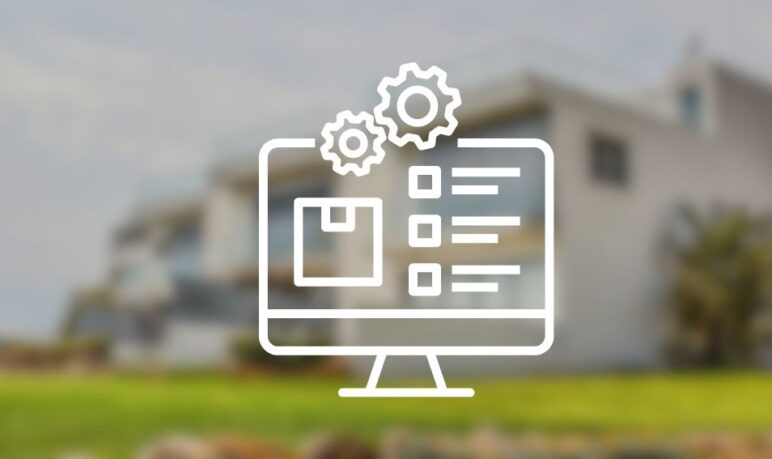
by Inez Kim June 25, 2024
Facing challenges in property management? Don’t worry you are not alone out there.
Managing properties is increasingly complex, encompassing a variety of tasks such as leasing, accounting, online marketing, payment processing, and compliance. Fortunately, property management software can streamline these operations by providing real-time information, allowing your team to manage properties more efficiently. This software is essential for various stakeholders in the property sector, including residential and commercial property managers, hotel owners, and real estate investors.
Choosing the right software to manage rentals and renters is crucial for effective property management. Understanding the key property management software features and ensuring they align with your company’s specific needs is important. In this article, we will explore the essential features of real estate management software, helping you make an informed decision for your business.
Continue reading as we delve into these features together and discover how they can enhance your ability to manage properties effectively.
In This Article
ToggleWhy Is Property Management Software Essential?

The benefits of property management software become clear once you start using it. It’s vital for managing extensive portfolios by providing a stable system that minimizes human error. While humans are prone to mistakes and overlooking details, this software consistently performs without fault.
It also enhances and consolidates separate systems for accounting and property management. Adopting a unified system addresses various problems, ensures continuous support, and provides access to new features.
Here are additional reasons why this software is beneficial:
- Efficient Operations: This software automates numerous routine tasks such as rent collection, tenant screening, and maintenance requests. Automation alleviates the administrative workload and decreases the chance of errors, leading to smoother and more efficient operations.
- Financial Management: The software facilitates easy monitoring of income and expenditures, automatic generation of financial reports, and integration with accounting systems. This efficiency not only saves time but also offers a direct insight into the financial status of the property.
- Improved Communication: These systems enhance communication between landlords, tenants, and contractors. Features like automated messages, email reminders, and a centralized platform ensure timely and accessible information for all parties involved.
- Maintenance Coordination: Online logging, tracking, and managing maintenance requests create an orderly approach to property maintenance. Tenants can place requests via an online portal, and landlords can efficiently assign tasks to maintenance staff.
- Accessibility and Mobility: Many property management software solutions are cloud-based, allowing access to data from any location on any device. This feature is especially valuable for property managers and landlords who need flexibility to work remotely or while traveling.
- Data Security and Backup: Strong security measures protect sensitive data from unauthorized access. Additionally, cloud-based storage provides reliable data backup, securing information against potential loss.
Key Features to Look for in Property Management Software for Effective Operations

In the digital era, property management software is indispensable for property owners and managers who want to enhance their operational efficiency. With a plethora of systems available, selecting the appropriate property management software features for your needs can be challenging. Here, we’ll discuss the crucial features that contribute to a property management software‘s efficiency and effectiveness.
- Automated Rental Listings
Rental platforms such as Zillow are essential tools for property management. They serve as the main platform for potential tenants looking for rental properties, and managing these listings effectively is crucial for filling vacancies quickly.
Property management software significantly reduces the effort needed to keep listings updated and consistent across major rental sites. Avail is an example of a property management solution that simplifies distributing property listings to multiple outlets.
A good property management system lets owners and managers input rental prices, lease terms, amenities, and photos once per property. It should then automatically distribute this information to leading sites like Realtor.com and Zillow, ensuring widespread visibility.
- Rent Collection and Accounting
Many property management systems facilitate digital rent collection, and they allow for streamlined property accounting at an affordable cost per unit.
These systems also support native payment processing capabilities. With the best tenant communication software, tenants can streamline communication with landlords and can choose to pay rent via different methods like debit card, credit card, or ACH (Automated Clearing House) transfers, and they can set up automatic payments to prevent late fees as well.
Offering streamline communication channels along with different online payment methods is now a standard expectation in the rental market, and lacking these options could turn potential tenants away from signing a lease.
From the landlord’s perspective as well, seamless communication during online payments simplify the process of tracking, enabling quicker resolution of missed payments. Some tools even make rent collection funds available by the next business day.
Additionally, property management software streamlines accounting tasks. When financial data is centralized, managing payables and receivables, budgeting for overhead costs, and preparing tax documents are more manageable.
- Lease Management
The lease agreement feature of best property management tools significantly simplifies the leasing process. It includes a comprehensive library of templates that comply with current standards, allowing you to quickly create new leases with just a few clicks. The system maintains a centralized database of all leasing information and sends notifications about upcoming lease renewals and expirations.
Tenants have access to individual portals where they can view leases and submit requests for renewals or terminations. The software also enables you to add custom clauses to leases and automates the tracking of any violations, applying penalties as needed.
Additionally, this software connects with TransUnion for tenant screening, enabling you to assess applicants’ credit scores and tailor screening criteria. Screening costs can be combined with application fees. For larger operations, the platform includes tools for managing renter’s insurance and security deposits.
Features Include:
- Tenant screening and credit scoring
- Drafting and management of lease agreements
- Tracking of applicants and leads
- Management of rent payments by individual beds
- Lease renewal processes
- Comprehensive databases for leases and tenants
- Insurance and security deposit management
- Historical tracking of transactions and billing
- Dedicated portals for residents and tenants
- Monitoring and management of lease violations
- Property Maintenance Features
Maintenance and repairs are critical and frequent responsibilities for property managers. These tasks encompass a variety of areas, such as appliance upkeep, landscaping, safety inspections, and routine, care of pools and community spaces, HVAC maintenance, security measures, and pest control.
Property management software features should significantly aid in managing these physical aspects by incorporating features like automatic reminders and work order management. The software should remind staff of necessary maintenance tasks, including smoke and CO2 detectors, checking fire extinguishers, conducting rental inspections, and flushing water heaters. These systems often feature built-in alerts, with some offering additional notifications via text and email.
An efficient property management system also includes robust work order management capabilities. This feature should allow for flexible prioritization, the ability to email work orders directly to vendors, the sharing of details electronically with property owners, and the integration of expenses into the accounting system.
Plus, enabling tenants to submit repair requests through a digital tenant portal streamlines the process, reduces paperwork, and improves efficiency. These systems can also be configured to allow property owners to view these requests, ensuring transparency and facilitating communication between tenants, managers, and owners.

- Reporting
Reporting is crucial for any business, including property management. A property management system should include a comprehensive reporting module. Hotels need to generate several key reports nightly. For example, a room and tax report details all room-related revenue for the day, and a shift audit report lists all transactions handled by each cashier.
Reports can generally be categorized into three types:
- Financial Reports: These reports focus on financial details, including taxes, revenue, net income, and commissions. They are vital for tracking cash flow and necessary for tax filing and compliance with government regulations.
- Production Reports: These reports analyze operational efficiency through metrics like distribution channels, rate plans, average daily rate (ADR), occupancy rates, and revenue per available room (RevPAR). Use these reports for strategic planning regarding distribution and pricing.
- Daily Activity Reports: These reports facilitate daily coordination among your staff. They cover departures, arrivals, and current guest information, contributing to efficient hotel management. They help organize the numerous daily activities and ensure smooth operations.
- Marketing
A channel manager is essential in marketing because it distributes property availability and details across multiple sales channels. It also allows you to set intelligent pricing rules that can vary by sales channel, customer profile, location, and other factors.
Modern marketing solutions include tools for creating websites with ready-to-use templates, intuitive drag-and-drop interfaces, and options for HTML customization. These websites adapt seamlessly to mobile devices and may feature integrated chatbots and concierge services to enhance user engagement. Additionally, these platforms enable the creation of guest cards, allow for tracking of customer interactions, and facilitate the launch of targeted marketing campaigns.
For content creation, platforms should offer services that help produce unique digital content. This can include virtual tours, 3D property maps, blogs, and drone-captured videos, enhancing your listings’ visual appeal and informational value.
Key features in these platforms include ADA-compliant website capabilities, chatbot integration, guest card tracking, dynamic pricing models, and tools for efficient listing and distribution. Effectively using these tools can significantly enhance your marketing efforts, making your properties more appealing and accessible to potential tenants.
- Mobile Application
For property managers, the ability to access their management system remotely is indispensable. Regular meetings with clients, hosting open houses, and traveling between properties no longer need to disrupt work activities. With a mobile application for your property management software, you can easily oversee properties, manage inspections, reply to emails, and communicate with clients, all from your phone or tablet.
To optimize customer relationship management (CRM) capabilities, developing a cross-platform mobile application is beneficial. This ensures compatibility and seamless operation across various devices and operating systems, enabling consistent access and functionality no matter where you are or what device you use.
- Integrations and Flexibility
Enhancing your system with new software or adding features to an existing system is often necessary for a property management business. It’s important to select the best property management tools that supports API extensibility and offers comprehensive developer documentation. This feature ensures easier and more adaptable connections with various tools.
Key integrations include API management tools, accounting software, business intelligence systems, cash payment processing software, and middleware platforms. Other useful integrations lead to scheduling software, payment gateways, and lease management systems. These integrations streamline numerous property management tasks, from financial operations to tenant communications.
Conclusion
Property management software is an indispensable tool for anyone managing real estate. It simplifies complex tasks, enhances operational efficiency, and provides real-time information crucial for decision-making. These systems support streamlined and effective management by integrating essential features like automated listings, rent collection, lease management, maintenance coordination, and robust reporting.
Additional benefits include improved communication, secure data handling, and flexible access through mobile applications. Selecting the right property management software tailored to your specific needs ensures smoother operations and better service to tenants, ultimately contributing to the success and growth of your property management business.
Frequently Asked Questions
Property management software should include automated rent collection, accounts payable and receivable, detailed financial reporting, and trust accounting. These features help manage tenant balances, property expenses, and ensure compliance with financial regulations.
Effective software lets managers issue work orders, track maintenance requests, and communicate with tenants and service providers via mobile apps or portals. Automated reminders and accounting integrations enhance operational efficiency.
Look for extensive reporting features that track occupancy rates, rental income, and maintenance costs. Customizable reports, real-time data access, graphical dashboards, and export options enhance decision-making and data visibility.
Leasing tools streamline tenant acquisition through online applications, screening, and e-signing. Marketing tools help manage property listings, build web presence, and attract tenants and property owners. Look for integrated marketing features and customer relationship management tools.